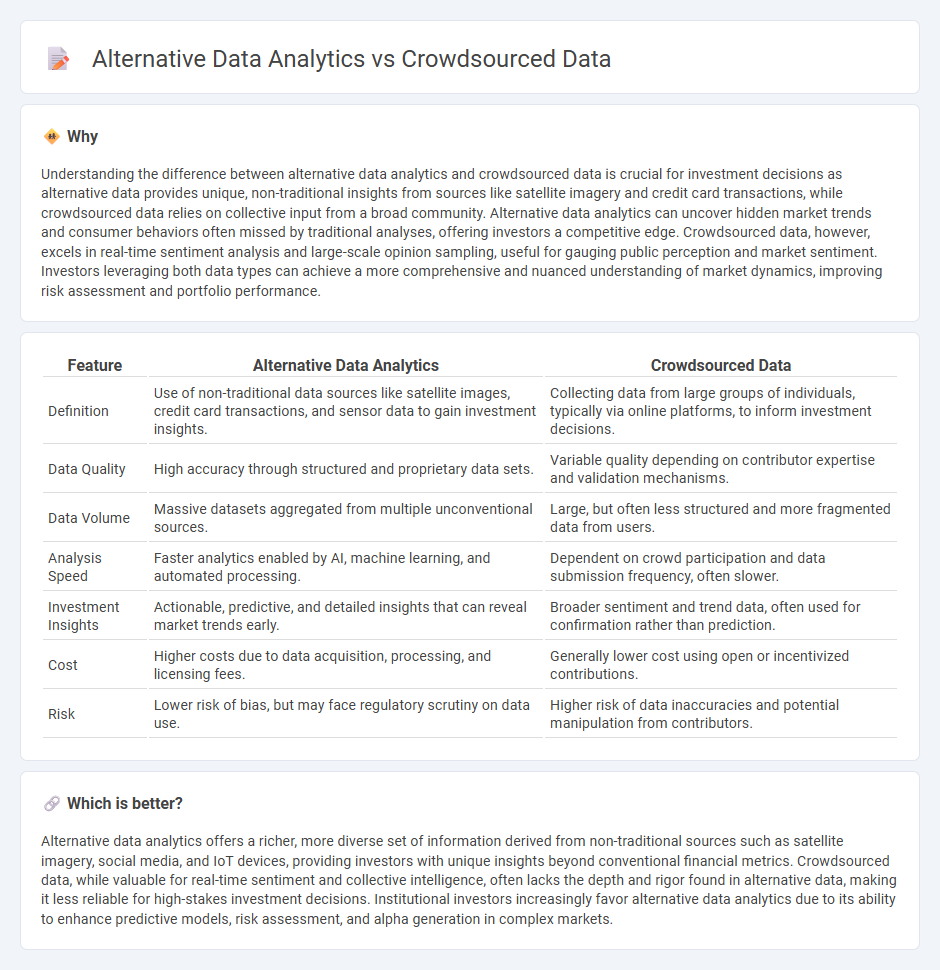
Alternative data analytics harnesses diverse data sources such as satellite imagery, social media activity, and transaction records to uncover unique insights that traditional financial metrics might miss. Crowdsourced data relies on contributions from large groups of individuals to aggregate real-time information, often providing a broad perspective on consumer behavior or market trends. Explore the differences between these innovative data strategies to enhance your investment decisions.
Why it is important
Understanding the difference between alternative data analytics and crowdsourced data is crucial for investment decisions as alternative data provides unique, non-traditional insights from sources like satellite imagery and credit card transactions, while crowdsourced data relies on collective input from a broad community. Alternative data analytics can uncover hidden market trends and consumer behaviors often missed by traditional analyses, offering investors a competitive edge. Crowdsourced data, however, excels in real-time sentiment analysis and large-scale opinion sampling, useful for gauging public perception and market sentiment. Investors leveraging both data types can achieve a more comprehensive and nuanced understanding of market dynamics, improving risk assessment and portfolio performance.
Comparison Table
| Feature | Alternative Data Analytics | Crowdsourced Data |
|---|---|---|
| Definition | Use of non-traditional data sources like satellite images, credit card transactions, and sensor data to gain investment insights. | Collecting data from large groups of individuals, typically via online platforms, to inform investment decisions. |
| Data Quality | High accuracy through structured and proprietary data sets. | Variable quality depending on contributor expertise and validation mechanisms. |
| Data Volume | Massive datasets aggregated from multiple unconventional sources. | Large, but often less structured and more fragmented data from users. |
| Analysis Speed | Faster analytics enabled by AI, machine learning, and automated processing. | Dependent on crowd participation and data submission frequency, often slower. |
| Investment Insights | Actionable, predictive, and detailed insights that can reveal market trends early. | Broader sentiment and trend data, often used for confirmation rather than prediction. |
| Cost | Higher costs due to data acquisition, processing, and licensing fees. | Generally lower cost using open or incentivized contributions. |
| Risk | Lower risk of bias, but may face regulatory scrutiny on data use. | Higher risk of data inaccuracies and potential manipulation from contributors. |
Which is better?
Alternative data analytics offers a richer, more diverse set of information derived from non-traditional sources such as satellite imagery, social media, and IoT devices, providing investors with unique insights beyond conventional financial metrics. Crowdsourced data, while valuable for real-time sentiment and collective intelligence, often lacks the depth and rigor found in alternative data, making it less reliable for high-stakes investment decisions. Institutional investors increasingly favor alternative data analytics due to its ability to enhance predictive models, risk assessment, and alpha generation in complex markets.
Connection
Alternative data analytics leverages non-traditional data sources such as social media activity, satellite images, and web traffic to uncover unique investment insights often missed by conventional financial analysis. Crowdsourced data, generated by a diverse range of contributors, feeds alternative data platforms with real-time, granular information that enhances market trend predictions and risk assessments. The integration of crowdsourced data into alternative data analytics enables investors to access a broader spectrum of actionable intelligence, improving decision-making precision and competitive advantage in financial markets.
Key Terms
Collective Intelligence
Crowdsourced data leverages the collective input from a diverse group of individuals to enhance data accuracy and insights, often harnessing open platforms and social media feeds. Alternative data analytics utilizes non-traditional data sources such as satellite images, sensor data, and transaction records to uncover hidden patterns beyond standard datasets. Explore the dynamic interplay between crowdsourced data and alternative data analytics to understand the full potential of collective intelligence.
Unstructured Data
Crowdsourced data leverages contributions from a diverse online community, providing vast, real-time, and often unstructured datasets such as social media posts, images, and GPS logs. Alternative data analytics encompasses various non-traditional data sources, including satellite imagery, sensor data, and web scraping, which also frequently involve unstructured formats requiring advanced processing techniques like natural language processing and machine learning. Explore the latest methodologies for extracting actionable insights from unstructured crowdsourced and alternative data to enhance decision-making accuracy.
Signal Generation
Crowdsourced data leverages large-scale user inputs to generate diverse, real-time signals for decision-making, while alternative data analytics integrates non-traditional sources like satellite imagery, social media, and sensor data to uncover hidden patterns and predictive insights. Signal generation from crowdsourced data emphasizes collective intelligence and granular, localized trends, whereas alternative data focuses on broader, multi-dimensional datasets to enhance forecasting accuracy. Explore how these methodologies transform signal generation in analytics to optimize your strategic outcomes.
Source and External Links
Crowd-sourced Data - Dime Wiki - World Bank - Crowdsourced data collection is a participatory method of building datasets with help from a large group, allowing researchers to collect widespread, real-time data at lower cost than traditional methods .
All About Crowdsourcing Data Annotation: Leveraging the Power of ... - Crowdsourcing in data annotation involves many contributors labeling data to train AI models, offering scalable, cost-effective, and high-quality dataset enrichment .
How to Crowdsource Data Successfully - Clickworker - Data crowdsourcing collects data from many sources quickly and cheaply, enabling businesses to gain valuable insights, provided projects consider goals, audience, and platform carefully .
 dowidth.com
dowidth.com